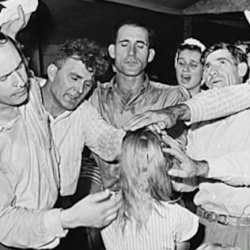In her editor’s introduction to Global Pentecostal and Charismatic Healing, Candy Gunther Brown observes: “According to the Pew Forum on Religion and Public Life’s Spirit and Power: A 10-Country Survey of Pentecostals (2006), more than a quarter—and in many countries two-thirds—of the world’s 2 billion Christians identify themselves as Pentecostal or Charismatic.”
Of these, “large majorities (more than 70 percent in 8 of 10 countries) of Pentecostals reported having personally experienced or witnessed the divine healing of an illness or injury. Even in the United States, which lagged behind the curve, 62 percent of Pentecostals reported personal experience with divine healing.” An extraordinarily high proportion (80–90%) of first-generation Christians in Latin America, Asia, and Africa “attribute their conversions primarily to having received divine healing for themselves or a family member.”
For these, salvation means “full salvation,” deliverance from sin, demons, and sickness. If this sounds egocentric, we should take a moment to consider the setting. Brown quotes Philip Jenkins’s penetrating rebuke. Jenkins acknowledges that “‘at its worst, the gospel of prosperity permits corrupt clergy to get away with virtually anything,’ including the justification of materialism, but Jenkins also emphasizes the powerlessness and dependence created by living in a very poor society and calls attention to the vested interests of prosperity’s critics in defending against ‘successful competitors for the souls of the faithful.’”
Brown’s collection of essays aims in part to dispel stereotypes of faith healers. Most healers ain’t Elmer Gantry. Few have TV shows or stations. Most healings “are transacted outside large religious services and without the ministrations of prominent evangelists, many of whom are more complex figures than the stereotypes suggest.”
Divine healing is linked to the disruptions caused by globalization, which is, among other things, the globalization of disease: “For the great majority of peoples living in the two-thirds world, especially in growing urban areas where high population densities and unsanitary living conditions facilitate the spread of disease, poverty and poverty-related infirmities are everyday realities that make daily survival uncertain.”
Divine healing also reflects the post-modern collapse of confidence in scientific advance and human reason. “Despite technological advances,” Brown points out, “many illnesses still baffle medical doctors. . . . Recognition of the limits of scientific medicine, even in industrialized nations, fuels therapeutic experimentation with divine healing—and with other alternative remedies, many of which invoke aid from personal or impersonal spiritual sources.”














